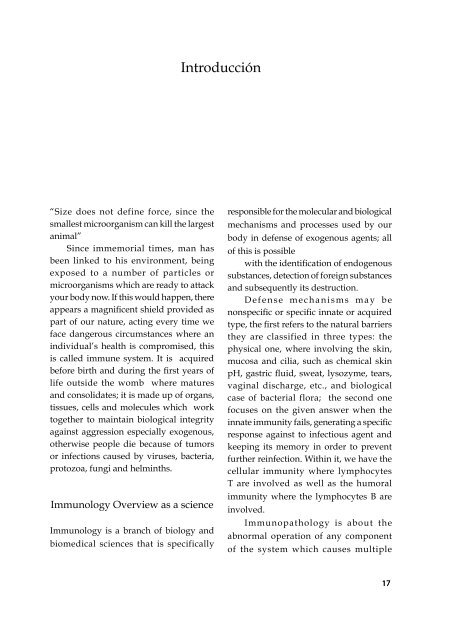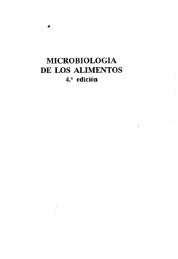Inmunologia Basica y Clinica Vol II
You also want an ePaper? Increase the reach of your titles
YUMPU automatically turns print PDFs into web optimized ePapers that Google loves.
Introducción<br />
“Size does not define force, since the<br />
smallest microorganism can kill the largest<br />
animal”<br />
Since immemorial times, man has<br />
been linked to his environment, being<br />
exposed to a number of particles or<br />
microorganisms which are ready to attack<br />
your body now. If this would happen, there<br />
appears a magnificent shield provided as<br />
part of our nature, acting every time we<br />
face dangerous circumstances where an<br />
individual’s health is compromised, this<br />
is called immune system. It is acquired<br />
before birth and during the first years of<br />
life outside the womb where matures<br />
and consolidates; it is made up of organs,<br />
tissues, cells and molecules which work<br />
together to maintain biological integrity<br />
against aggression especially exogenous,<br />
otherwise people die because of tumors<br />
or infections caused by viruses, bacteria,<br />
protozoa, fungi and helminths.<br />
Immunology Overview as a science<br />
Immunology is a branch of biology and<br />
biomedical sciences that is specifically<br />
responsible for the molecular and biological<br />
mechanisms and processes used by our<br />
body in defense of exogenous agents; all<br />
of this is possible<br />
with the identification of endogenous<br />
substances, detection of foreign substances<br />
and subsequently its destruction.<br />
Defense mechanisms may be<br />
nonspecific or specific innate or acquired<br />
type, the first refers to the natural barriers<br />
they are classified in three types: the<br />
physical one, where involving the skin,<br />
mucosa and cilia, such as chemical skin<br />
pH, gastric fluid, sweat, lysozyme, tears,<br />
vaginal discharge, etc., and biological<br />
case of bacterial flora; the second one<br />
focuses on the given answer when the<br />
innate immunity fails, generating a specific<br />
response against to infectious agent and<br />
keeping its memory in order to prevent<br />
further reinfection. Within it, we have the<br />
cellular immunity where lymphocytes<br />
T are involved as well as the humoral<br />
immunity where the lymphocytes B are<br />
involved.<br />
Immunopathology is about the<br />
abnormal operation of any component<br />
of the system which causes multiple<br />
17


















